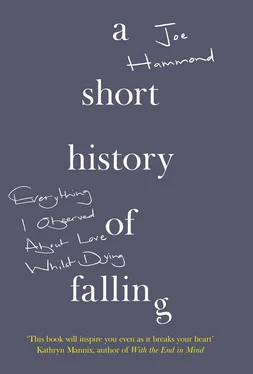He’s not the first person I’ve picked out, wondering whether he or she is the same as me. Wanting to ask. I fabricated a notion that this man’s symptoms might have been further on than mine. Perhaps he had been slow to refer himself, and was soldiering on. A man who was continuing to work in the face of considerable difficulty – wondering why his foot wouldn’t lift off the ground. Wondering why he was always toppling over like an old wet tree in the rain. And waiting for it all to stop, for the body to return, to heal, because that is what the body does.
I don’t think I’m looking for my comrades any more. Not with quite that expectation. Or with that sense of shocking newness I want to share. But still, when I’m with a friendly physio or occupational therapist, I often end up asking about their other patients. I must want to find someone like me. Someone out there with children who is where I am with this disease. Someone out there who is writing about it. Wanting it to be OK. Willing it to be OK. I want to meet this person.
*
It’s shocking to me that I have a spastic leg. I’m struck by its arcing trajectory, its banana-shaped inefficiency, and by the sticks I use to compensate for it. And by the wheelchair I will one day be consigned to, the toileting aids that await me, disfigurement, the premature ageing. These are all shocking to me; I’m calm about it, but still shocked. I’m calmly shocked.
All my life I’ve convinced myself that I have a remarkably striking physical appearance. Unfortunately, I have been capable of believing that almost anything about me, or almost anything I’ve done, might be remarkably brilliant. I have been afflicted by this delusion for my entire life. There’s nothing unusual about this. It’s just the dreariness of narcissism. Only the route towards narcissism is unique. The real stuff. The narcissism itself, the affliction, is dull, boring and predictable. And as with all narcissism, mine has an obverse side which is equally true and equally present: the unrelenting conviction that when I’m not being remarkably clever and beautiful, I’m being remarkably stupid and ugly.
But now I’m living with a concept that is neither. It’s not life at the end of either of these two extremes. It’s not even on the same linear scale. These days I’m preoccupied by the surprises in my life. The way the body reminds me of myself. The saliva I’m now collecting in my mouth. It’s this. It’s all the tiny signals I experience. The not swallowing. The lagoons beneath my tongue. These pools of saliva don’t interest the narcissist in me. In the presence of such novel details I’ve finally found a way to bore him. With my actual body. The volumes of swallowed juices that sluice away like the downpipe from a toilet stack. Sometimes when I inhale they inadvertently skim backwards with a splutter and a choke. Or, if I’m lying on my front, a small amount disappears over the curve of my bottom lip. Just a little for now, over the side of the bed. Just a tiny stream from a toy teapot. A darkened dot on the carpet. Everything starts as something small. There are no shocks. This is a gentle kind of devastation.
When I was a much younger man I spent a year or so not being narcissistic. I had found God, briefly. I knew him for a year. He loved me and I loved him and my narcissism ebbed away. I felt the tension in my body release. I felt my 25-year-old body open up, after many years of tightness. When I no longer felt I knew him, my narcissism returned. My body closed again, as if a season had passed. This sounds glib, but it’s the truth. And even though I lost hold of what I had found, I don’t think a person ever completely loses what they have had. I’d lived with a level of shock and confusion my entire life, but something had been lifted that was never completely pushed back down again.
And now, being a man with a spastic leg, finding myself being wheeled through an airport in a wheelchair, as I was earlier today, I realize this is the culmination. It’s finishing something, finally and decisively. I’m a man with a disability. My body is the truth now and it’s saving me from myself. I have all these losses, and feel a kind of freedom in that. With each awkward, spasmodic movement, or the difficulty I have wiping my own bottom, or with the slur developing in my voice, the narcissist recedes. There’s nothing for him here. Not any more. It’s death to him. The phoney.
You wasted a lot of my life. Nothing you did was ever real.
*
In the weeks and months that followed my diagnosis I received dozens of suggestions about how I might combat my decline. Some fell into the category of tonic and these included several exotic examples, such as a paste made from mixing water with powdered scrapings from reindeer-horn velvet. I was also advised to start my day with warming spices, so that I might have a ginger or a cinnamon tea. Or I could have eggs for breakfast and cook them with turmeric and cumin.
Other suggestions have been less to do with ingestion than the functions or processes that I could add or alter within my body. In one of the loveliest examples a friend espoused the medical benefits that singing could offer me. A more prosaic example was that I could slow the progression of the disease by chewing my food more slowly.
In some cases, these suggestions have been delivered with little confidence. Perhaps they’re offered if a person feels awkward and wants to think of something positive to say – so that it might be something they’d heard about from someone or caught as a snippet on the radio. On one occasion I received a text from a friend to inform me that a new drugs trial in India had yielded miraculous results. I texted back to ask for more details but, unfortunately, he was unable to be more specific. I wondered if he might have the name of a town or medical institution so that I could narrow it down a little but, no, it was just something that was happening broadly within the nation of India.
Others have been far more confident in their approaches – strikingly so. I’m particularly thinking of two parents from Tom’s previous school in Portugal. In both cases, I didn’t know the people involved that well and they had first learnt of my condition from chatting to another parent in the playground. In the case of these two women it was interesting to note some common attributes to their communication style. Both times the initial engagement involved gently touching my elbow and very sensitively, very earnestly, leading me away from a mingled group of parents. What I then noticed was the closeness of the physical space they occupied, so that the intensity of the eye contact lent the exchange a certain gravity and seriousness.
As for the suggestions themselves, they were both to do with diet. I have noticed that people can be at their most fervent when making claims that this or that diet can combat my decline. I group these two approaches together because each person espoused a dietary regime which, as far as I can tell, appeared to be the diametric opposite of the other. So that one of them was suggesting a diet based exclusively on fats and animal protein, whilst the other suggested a vegetarian diet of brown rice, sea vegetables and pulses.
As these two separate discussions continued, and the volume of parents surrounding us thinned significantly, it became clear that these two women weren’t actually prescribing a bespoke cure for my specific neurological condition; in fact, it wasn’t entirely clear that they knew what my condition was. It didn’t appear to be the case that the diets could specifically prevent my motor neurones dying. Instead I was offered the reassurance that they themselves, and their family – as notably healthy and flourishing individuals – were also following this dietary regime and that anyone else in their right mind should be doing the same. As time went on, and we met repeatedly in the playground – and it became clear that I wasn’t following their guidance – the looks on their faces conveyed a saintly form of disappointment. I had been offered the way but clearly lacked piety. In this respect, it seemed that I hadn’t been approached by two friendly and knowledgeable parents but by two variants of the same religion.
Читать дальше











